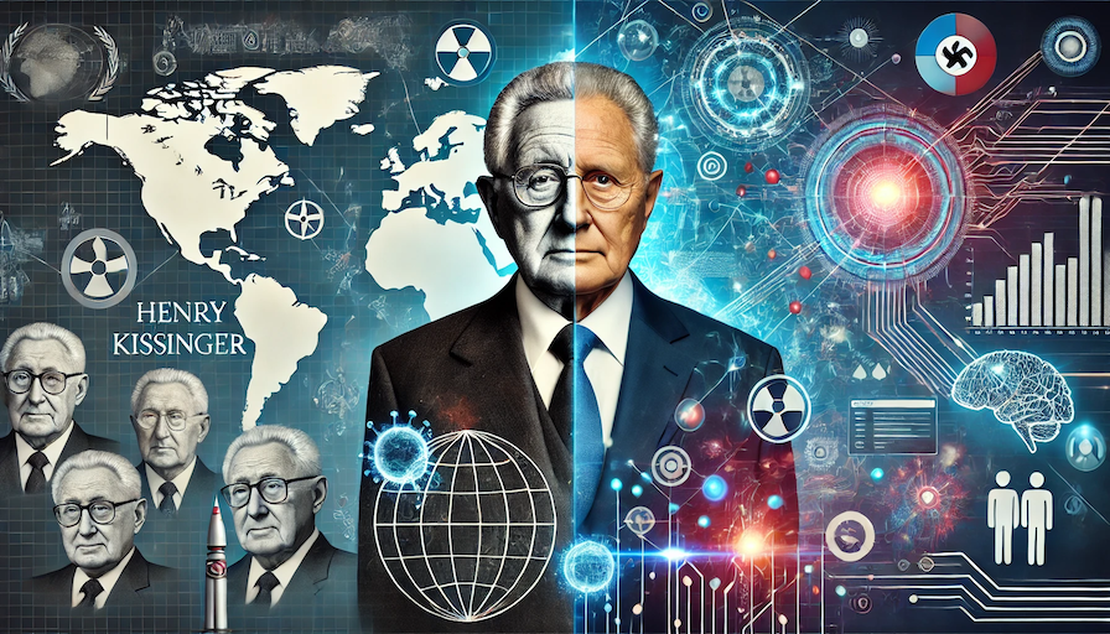Kissinger: From Cowboy to Genesis
Henry Kissinger’s name is synonymous with global diplomacy. His legacy spans decades, marked by his role as a strategist, statesman, and, later in life, a thought leader on the challenges shaping humanity’s future. Comparing the brash, image-conscious figure interviewed by Oriana Fallaci in the 1970s to the reflective author of The Age of AI: And Our Human Future reveals a fascinating evolution of thought—one that underscores why Kissinger’s insights remain vital.
The 1970s Kissinger: The Pragmatist in the Spotlight
In the 1970s, Kissinger was at the height of his power, serving as both National Security Advisor and Secretary of State under President Nixon. Oriana Fallaci’s infamous interview with him, later described by Kissinger as “the most disastrous conversation I ever had,” captured a man keen to craft his public image. His description of himself as a “cowboy” riding alone highlighted his tendency to romanticize his role in shaping U.S. foreign policy.
This was the Kissinger of Realpolitik, a strategist focused on advancing U.S. interests through pragmatic and, at times, controversial means. His accomplishments during this period were substantial:
- Cold War Détente: Orchestrating arms control agreements with the Soviet Union, such as SALT I.
- China’s Opening: Paving the way for U.S.-China relations with Nixon’s visit to Beijing in 1972.
- Middle East Diplomacy: Securing ceasefires and shaping U.S. influence after the Yom Kippur War.
- Vietnam Peace Accords: Negotiating the end of U.S. involvement in Vietnam, though the accords’ long-term success remains contentious.
However, Kissinger’s pragmatism often came at a moral cost. He was criticized for supporting authoritarian regimes, orchestrating coups (notably in Chile), and authorizing secret bombings in Southeast Asia. These actions cemented his reputation as a master strategist but also as a polarizing figure who prioritized power over human rights.
The Kissinger of Today: Reflecting on Global Challenges
Fast forward to recent years, and Kissinger emerges as a reflective thinker confronting the existential challenges of the modern world. In his 2024 book, Genesis: Artificial Intelligence, Hope, and the Human Spirit, co-authored with Eric Schmidt and Craig Mundie, Kissinger delves into the implications of artificial intelligence on global society, politics, and ethics.
The transformation is striking. In the 1970s, Kissinger navigated the tangible threats of the Cold War, balancing nuclear power and geopolitics. In The Age of AI, he grapples with intangible yet equally profound dilemmas:
- How will AI reshape global power dynamics?
- Can humanity develop ethical frameworks to manage AI responsibly?
- What does it mean to be human in an era where machines challenge our cognitive superiority?
This evolution from the pragmatist to the philosopher highlights Kissinger’s enduring relevance. His exposure to the levers of global power gives his reflections on AI and the future of humanity a weight few others can match.
Why Kissinger Still Matters
Despite his polarizing legacy, paying attention to Kissinger remains crucial. His career offers unmatched insights into the workings of power and diplomacy. Just as his strategies in the 1970s shaped the geopolitical order of the late 20th century, his reflections today compel us to think critically about the challenges of the 21st century.
Kissinger’s unique perspective stems from his exposure to crises that spanned ideologies, continents, and decades:
- The Cold War taught him the fragility of global stability.
- The rise of China illustrated the need for adaptive diplomacy.
- Emerging technologies, like AI, underscore the necessity of ethical foresight.
In an era where the world faces interconnected challenges—from climate change to cyber threats—Kissinger’s ability to synthesize historical lessons with forward-looking analysis makes his insights indispensable.
A Legacy of Global Challenges
Oriana Fallaci’s interview with Kissinger in the 1970s captured a man grappling with the immediacy of Cold War politics. Today, his work addresses the profound questions of humanity’s future. Whether as a cowboy of diplomacy or as a sage of technological ethics, Kissinger’s journey underscores a universal truth: understanding global challenges requires both pragmatism and reflection.
In a world increasingly shaped by rapid technological change, Kissinger’s evolution reminds us of the importance of bridging the past and the future. His lessons, both controversial and profound, demand our attention—not just for what they teach about history but for what they reveal about the challenges yet to come.
⚠️ Please take a look at the LLM Disclaimer
